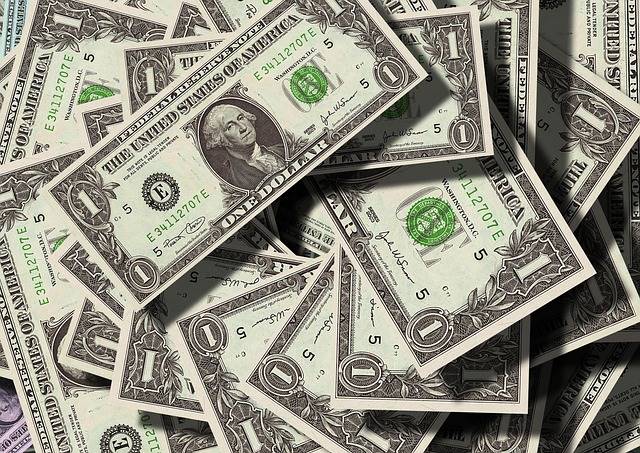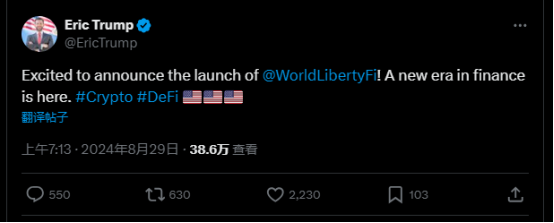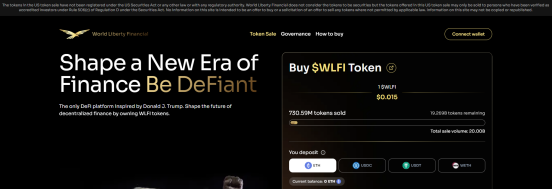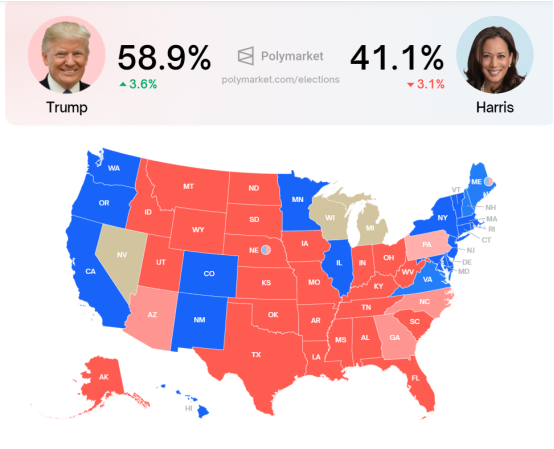Author: Gyroscope Finance

Trump, a new trick up his sleeve.
On October 15, the Trump family's DeFi project World Liberty Financial token WLFI officially went on public sale, and prior to that, the project team had been conducting nearly 2 months of promotional pre-heating, with the entire Trump family of four joining in, and Trump himself standing on Space and X multiple times to call for support, becoming a new generation of cryptocurrency endorsers.
However, compared to its ambitious fundraising target of nearly $300 million, the token sale on the first day only raised over tens of millions, still far from the target. The market seems to have become desensitized to the promises that come out of nowhere, leading to a trend of withdrawal from betting on Trump, not to mention the controversy over nepotism that the project had before.
On the other hand, with only 20 days left until the election, the precise appearance of the cryptocurrency project at this time also seems to have a different meaning.
On October 15, the World Liberty Financial token WLFI officially went online, opening up public sales to whitelisted users, and just 1 day earlier, the project team had live-streamed an introduction, claiming that they already had over 100,000 qualified whitelisted users.
Looking back at the development of the project, the pre-heating started as early as February. First, Trump's younger son Eric Trump suddenly expressed his love for DeFi, then the elder son Donald Trump Jr. posted that DeFi is the future loyalty, on August 16, the elder son also opened a Telegram channel called The DeFiant Ones for the cryptocurrency project, followed by endless previews, whetting the market's appetite.
Finally, on August 29, the project unveiled its veil, with Eric Trump announcing the launch of World Liberty Financial (WLFI), and the important guest Trump naturally also added fuel to the fire, releasing a project-related video, while also mentioning the slogan of the crypto capital of America again.

Although it claims to return the power of finance to the people, in fact, even until the token release, the project's official whitepaper has not yet appeared, only a "gold paper" is available for introduction, and the specific technical details and operational methods are unclear. Based on the roadmap and gold paper obtained by The Block, a glimpse of the project can be seen.
World Liberty Financial is led by co-founders Steve and Zach Witkoff, Folkman and Chase Herro, aiming to promote the large-scale adoption of digital assets through a compliant one-stop alternative finance platform, where users can borrow and lend cryptocurrencies, create liquidity pools and use stablecoins for trading. The Trump family is deeply involved in the project, with Trump being referred to as the "Chief Cryptocurrency Advocate" in the whitepaper draft, and Trump's two elder sons serving as "Web3 Ambassadors", while the younger son also naturally serves as the so-called "DeFi Visionary".
The roadmap shows that the project is divided into three stages, the first stage is built on the Scroll based on the Ethereum lending platform Aave, focusing on crypto banking, and this part of the plan has already been launched. The second stage is to integrate with exchanges, allowing users to make purchases through on-chain proof of KYC compliance, specifically, the project plans to create a credit card focused on stablecoins. The final stage is to securitize real-world assets, i.e. return to its original business, which may involve real estate-related token projects.
Although the project's plan is vague, the token distribution is quite clear. 63% of the token supply will be sold to the public, of which 17% is for user rewards and 20% is for the team. This initial token sale will seek to raise $300 million, selling 20% of the token supply at a fully diluted valuation of $1.5 billion, with a total token supply of 20 billion. To avoid SEC regulation, the project's token sale is conducted under Regulation D, limiting the sale size and only selling to accredited investors, and the tokens are also not transferable, but token holders have governance voting rights over the project's development.
Looking at the first day's sales, as of 3:30 pm on October 16, about 730.53 million WLFI tokens have been sold, with 19.269 billion tokens remaining. Calculated at $0.015 per token, the sales amount to approximately $10.9579 million. For a brand new project, the first day's fundraising performance is already impressive, but compared to the original $300 million plan, it is still far from the target.

As for why the market is no longer buying into it, the reasons are quite direct. For a project where the tokens are non-transferable and the whitepaper is unclear, the risk of throwing money at it is quite high. On the other hand, the project itself also has many flaws.
First of all, the project team. Although the Trump family is fully involved, as traditional real estate giants, they clearly have no experience in cryptocurrency, and their titles in the whitepaper draft also show that they are more like mascots to increase influence and wait for the money to come in. In this context, the actual project operation and management naturally falls on the co-founders.
Among the co-founders, Folkman and Chase Herro both come from Dough Finance, a DeFi project established in April this year based on AAVE, but was hit by a flash loan attack on July 12, losing $2 million, and the project is now basically in a state of stagnation. With this as a precedent, the market also has rumors that WLFI will directly copy the code, bringing security risks. Folkman himself also has a history of founding a course to attract beautiful women for dating, which has greatly reduced the market's trust and professionalism in him.
Chase Herro's reputation is no better, having been imprisoned for long-term drug use in his youth, selling weight loss pills and get-rich-quick courses, and launching another cryptocurrency trading business called Pacer Capital a decade ago, which no longer exists.
With the poor reputation of the actual operators, the Trump family members being ignorant of cryptocurrency, and the tokens being non-transferable and only for governance purposes, the purpose of establishing this project has quickly come under question.
Industry analysts believe that this project is merely a way for Trump to expand his fundraising channels, in other words, an alternative form of political donations. This claim is not without basis, as compared to the always more abundant funds of the Democratic Party, the Republican Party has encountered obstacles in fundraising, according to Federal Election Commission documents, as of July 31, the Harris team had raised $770 million and spent $440 million, while the Trump team had raised $570 million and spent $310 million. According to the latest data disclosure, in the three months from July 1 to September 30, the Harris team has raised $633 million, an amount and speed that is rare even in elections, while Trump only raised $350 million in the third quarter, the gap between the two is huge.
In terms of funding channels, Harris's external fundraising is mainly through the Carey Committee, while Trump is mainly through SuperPAC, although both have unlimited funding donations, the former can additionally increase the "direct donation" function, i.e. the amount can be directly donated to the candidate and the party, but the latter can only be used for unlimited advertising and publicity expenses, which is less efficient than the Harris team.
Based on the above reasons, Trump's sudden addition of a cryptocurrency channel just before the election is quite reasonable, the token sale itself is a way to make quick money, which does not match the $300 million high financing that the project intends to obtain, after all, not every project dares to set a 3 billion target just as the tokens are about to go on sale, and on the basis of governance tokens. Of course, this also means that the success or failure of the project is closely tied to Trump's election, and the subsequent benefits obtained are more important to the donors, but from the current situation, the Trump family still has high hopes for the project and has also set their sights on the stablecoin segment of the cryptocurrency cash cow.
On the other hand, Trump's launch of a cryptocurrency project at this time further consolidates his own cryptocurrency inclination, which is reflected in reality, making the Trump's wild promises more credible and beneficial to gaining key support from the cryptocurrency field.
It is precisely for this reason that politically-tinged projects have not been widely acclaimed. But in terms of winning rate, although as of October 10, Harris was still leading Trump by 2 percentage points at 49% in the polls, according to the encrypted prediction market, Trump has already surpassed him, with a 58.9% winning rate, far exceeding Harris by 17 percentage points. And in the key swing states, Trump has also regained the lead, with Michigan, Pennsylvania and Nevada all surpassing Harris, with 6 out of the 7 swing states now leading, and if this trend continues, Trump may be just one step away from winning the election.

It is worth noting that in this campaign, a very critical Trump supporter is his old friend in the crypto world - Elon Musk. It is reported that from July 3 to September 5, Elon Musk donated $75 million to the America PAC supporting Trump, although lower than the previously announced $45 million per month, this amount has also made him one of Trump's largest donors.
But it is quite strange that going back to before 2020, Musk was very dissatisfied with Trump's previous withdrawal from the Paris climate agreement and publicly stated that he was a supporter of the Democratic Party. Just in 2022, the two were even online spitting objects, with Musk openly stating that Trump should hang up his hat and retire. Trump responded by calling Musk a "businessman dependent on government subsidies" and using very biting language to satirize Musk's previous behavior of seeking project subsidies at the White House.
By July this year, after Trump was assassinated, the two suddenly reversed their attitudes and became friends. In August, Musk had a dialogue with Trump on Space to promote him, attracting millions of online viewers; in October, Musk even appeared at Trump's campaign site to endorse him, and even openly bought votes, saying that voting would give $47. In addition to the high-amount donations, Musk can be said to be fully supporting him.
As for the reasons for their reconciliation, according to Musk, supporting Trump is because the current policies and values of the Democratic Party are not in line with his own, Musk believes that the Democratic Party's tolerance of racial diversity has accelerated the division of America, and the subsequent Biden administration's weakness in clean energy and automotive electrification, as well as various targeting of SpaceX and Twitter, have also strengthened his determination to side with the Republican Party.
On the other hand, in addition to the pressure of government orders and regulatory direction, Musk himself also seems to have a strong interest in politics, and from this perspective, choosing Trump, whose political foundation is not yet fully established and is far from the core of the well-established bureaucratic establishment, is obviously more in line with Musk's conditions in terms of business interests and political prospects. Currently, Trump has already changed his previous attitude and promised to support electric vehicles, and said that if he takes office, Musk can serve as the Minister of Cost Reduction.
But once the bow is drawn, there is no turning back, and the public figure's public stance naturally also means great danger and backlash, Musk has publicly mentioned that if Trump loses the election, he may face strong retaliation from the Democratic Party, or even personal safety issues. Against this background, Musk's strong endorsement seems quite normal in order to ensure his own safety.
For any person involved in politics, the election is a high-stakes gamble, and it is difficult to say who will win until the very end. In this process, the various verbal battles between the campaigns are just appetizers, and the real stage is the unseen power struggle behind the scenes, with any move by politicians based on interests and votes.
Musk's friendship is like this, and the establishment of crypto projects is no different. As for the subsequent development of the DeFi project World Liberty Financial launched this time, whether it can truly serve the crypto world, the answer may also be of no concern to anyone.






